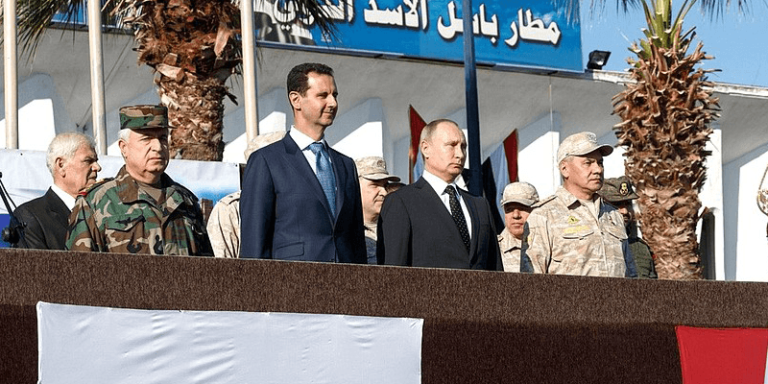
Syria today is experiencing serious economic, political, and security problems as the Bashar al-Assad regime maintains control over its people without regard to their dire circumstances. Damascus and other Syrian cities are witnessing massive shortages in liquefied natural gas used for cooking and lighting; this is in the near-absence of state-supplied electricity as a result of years of war. Endless lines have become the norm as people wait for hours to buy gas cylinders and gasoline. Such scarcity has necessitated a reversion to animal-drawn carts to transport passengers and commuters.
In addition to electricity, other necessities like drinking water and access to schools have been totally cut off from areas that supported the opposition such as Darayya, Muathamiyya, towns in the Damascus countryside, and areas of Homs and Aleppo. These and other locales have actually lost many of their inhabitants and are now unable to acquire construction materials in order to rebuild after the regime’s aerial assaults. The Russian air force also carried out its share of destruction in Aleppo, Duma, and Harasta, which have become virtual trash heaps because of the lack of machinery to lift large debris from collapsed buildings.
The last few months have shown that the regime’s main allies, Russia and Iran, do not appear to be willing to assist in addressing the country’s difficult domestic economic situation.
The last few months have shown that the regime’s main allies, Russia and Iran, do not appear to be willing to assist in addressing the country’s difficult domestic economic situation. They realize that the cost of rehabilitating Syria from destruction is too high, especially considering the unprecedented pressure on the Iranian economy from the Trump Administration, which has decided to end Iran’s hydrocarbon exports. As it is today, Iran’s inflation rate and the prices of essential commodities such as foodstuffs and fuel are skyrocketing while the Iranian riyal has lost its value against the US dollar. Such a situation cannot be conducive to a ready Iranian assistance package for the Syrian regime, whose coffers appear to have been emptied of all reserves to serve President Bashar al-Assad’s war on the Syrian people, practically making Syria a failed state.
The Latest Astana Talks and the Road to the Unknown
Amid Syria’s dire economic condition and Russia and Iran’s inability to assist, Moscow, Tehran, and Ankara held a meeting in Astana, Kazakhstan, that had no tangible results. Geir Pedersen, the new United Nations envoy to Syria who attended the meeting, had hoped it would lead to a breakthrough in discussions about the formation of a new constitutional committee for Syria. His hopes were dashed, as was obvious from a communiqué about the meeting that ironically encouraged Pedersen to hasten the work of creating such a committee.
It also has become obvious that Russia’s desire to repatriate Syrian refugees may have waned. The realities of war on the ground have made clear that repatriation is merely a Russian ploy to give legitimacy to the regime and to Moscow’s efforts to assist Damascus.
It also has become obvious that Russia’s desire to repatriate Syrian refugees may have waned. The realities of war on the ground have made clear that repatriation is merely a Russian ploy to give legitimacy to the regime and to Moscow’s efforts to assist Damascus. Russia did not even help in advancing the idea of forming a constitutional committee for the country; instead, it has been encouraging the regime to begin its assault on the last area under opposition control in Idlib in the northwest. It has allowed also regime aircraft to resume their barrel bomb attacks on different areas of the province, which have killed scores of innocent civilians. Indeed, Russia shows a clear inclination toward a military solution to the Syrian war despite its proclamations to the contrary in Astana or elsewhere.
Russia’s True Aims
On the other hand, Russia has shown eagerness for memorandums of understandings and contracts with the Syrian regime to invest in what remains of the country’s natural resources. It has signed a 49-year agreement1 to invest in Tartous port on the Mediterranean as well as other contracts to exploit gas fields in the Homs countryside and other locations. But these contracts have not obscured the fact that Russia is beginning to realize that its adventure in Syria will not bring the benefits it expected and has negatively affected its reputation in the Arab world. In sum, Russia now grasps that it has wasted its energies on a regime that cannot even defend itself.
Russia is beginning to realize that its adventure in Syria will not bring the benefits it expected and has negatively affected its reputation in the Arab world. In sum, Russia now grasps that it has wasted its energies on a regime that cannot even defend itself.
Russia today is interested in investment contracts in Syrian institutions and resources that the government does not want to appear as ownership contracts for land. Minister of Transportation Ali Hammoud said that the Tartous deal was simply to establish a 49-year partnership with a Russian company, Stroytransgaz, to manage and widen the port in accordance with Syrian laws on public-private partnerships. The reality, however, is that the agreement was to widen the port facility at Tartous for the benefit of the Russian naval fleet and extends to other ports and areas in the Syrian interior. Moreover, the agreement had already been approved by the Russian Duma and the upper house, the Federation Council, and became a Russian federal law in December 2017. The agreement was executed on January 9, 2018.
Article 2 of this agreement openly stipulates that the Russian party gets to control, free of charge and for the life of the agreement, all the land and water adjacent to the port, a logistical center (the actual naval base), as well as the floating platforms and the sea beds, all drawn in secret attached annexes. Article 25 allows automatic renewal of the agreement for a period of 25 years—if none of the parties expresses a desire to end it through a diplomatic memo at least one year before its expiry. Furthermore, Article 7 states that if there were a need, the Syrian side would transfer any additional and needed structures for temporary use, at no cost. Such structures will be discussed and agreed upon in separate protocols. Finally, any buildings the Russian side constructs on Syrian soil according to this agreement will be owned by Russia.
But what clearly indicates that the agreement paves the way for a Russian occupation of Syrian territory is Article 8, which states that Russian nationals––employees, crew members, contractors, and accompanying family members––have the freedom to cross Syria’s borders unhindered. They also will be exempt from inspection by Syrian personnel as they cross ports of entry, and Syrian officials cannot enter Russian installations without prior approval from the latters’ commanders.
The same situation is applied to other contracts, such as the natural gas installation east of the city of Homs which produces 7 million cubic meters per day, and the Twinan installation, at 1.4 million cubic meters.2 The Syrian regime also signed a 40-year, $200 million contract3 between the government’s General Establishment of Chemical Industries and the Russian Stroytransgaz that went into effect last March to invest in a fertilizer plant in Homs. Stroytransgaz also signed a 50-year contract with the General Establishment for Geology and Mineral Resources to extract phosphates from the east of the country, an agreement that was approved by Syria’s People’s Assembly last year.
It thus has become evident that all of Syria is now up for sale—or for so-called “investment,” as the Syrian regime prefers to call it. But these investments concern Syria’s vital strategic assets, and they are being signed off to a sole party, Russia. As things stand today, no one can object. For Russian President Vladimir Putin, these investments are the price of intervention in Syria to save the regime, one that has no other means to pay Moscow back. In reality, however, it is Syria’s future generations who will pay the price over and over again as Russian soldiers continue to prop up the regime of Bashar al-Assad.
1 Source is in Arabic.
2 Source is in Arabic.
3 Source is in Arabic.

